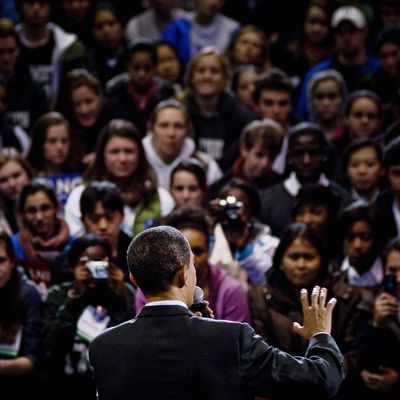
Certain presidencies tend to become symbols of generational change, sometimes deliberately. In his 1961 inaugural address John F. Kennedy proclaimed himself the standard-bearer of “a new generation of Americans, born in this century.” Jimmy Carter and George H.W. Bush, born in the same year (1924), represented the tail end of the Greatest Generation, those who fought and won World War II. Poppy’s successor, Bill Clinton, was famously the first baby-boom president, and brought with him a baby-boom veep.
Meditating on this history, Peter Beinart notes that the first post–baby-boom generation, the so-called Generation X (those born from 1965 through 1980), appears to be in danger of not having a president at all. He suggests that Gen-Xers are prisoners of a politics shaped by baby-boomers that is no longer relevant, particularly to the millennials who are already succeeding them in high political office.
But Beinart’s argument raises an interesting collateral question about the big generational change we thought was happening 12 years ago, which proved to be a false dawn of a new era: the rise to the presidency of Barack Obama, a late boomer who, in every important way, reflected the sensibilities and experiences of post–baby-boomers.
My colleague Andrew Sullivan brilliantly captured an emerging theory about Obama in 2007:
Obama’s candidacy in this sense is a potentially transformational one. Unlike any of the other candidates, he could take America — finally — past the debilitating, self-perpetuating family quarrel of the Baby Boom generation that has long engulfed all of us …
At its best, the Obama candidacy is about ending a war — not so much the war in Iraq, which now has a momentum that will propel the occupation into the next decade — but the war within America that has prevailed since Vietnam and that shows dangerous signs of intensifying, a nonviolent civil war that has crippled America at the very time the world needs it most. It is a war about war — and about culture and about religion and about race. And in that war, Obama — and Obama alone — offers the possibility of a truce.
Many of us harbored this or similar beliefs about Obama then and right through his first days in office — but not much longer than that. As we now know, the cultural and political wars of the baby-boom generation continued, and in many particulars, intensified. We are now living in an era dominated by the latest baby-boom president, one who has skillfully manipulated divisions that appeared long ago — divisions that festered in the toxic atmosphere of the Great Recession that Obama inherited. But since the entire Western world is struggling with similar tensions, it’s hard to blame it simply on Trump — or on Obama, for that matter.
As Beinart notes, the country moved backward in more than one respect with Trump’s ascension to the White House: “Rather than choose a generational successor, America elected a candidate 15 years older than the president he replaced, the largest such jump in American history.” But from a generational point of view, the retrogression is continuing. The odds are high that in 2020 the presidential general election will pit early baby-boomer Trump against either another early baby-boomer (Elizabeth Warren, born in 1949), or someone representing the pre–baby-boom Silent Generation (Joe Biden, born in 1942, or Bernie Sanders, born in 1941).
Indeed, if Obama could somehow come back and run for president again 12 years after his supposed generational breakthrough, he’d be only the fifth oldest candidate on that stage in Houston tonight. For that matter, if boomer pioneer Bill Clinton could run again 28 years after his election as president, he’d be younger than Trump, Biden, and Sanders.
As a baby-boomer myself, it’s nice to have so many presidential candidates around who remember the Kennedy and MLK assassinations, the first moon landing, and Woodstock. But it’s kind of ridiculous that we can all look at two of the three Democratic front-runners and say: “When is that generation finally moving on?”






























